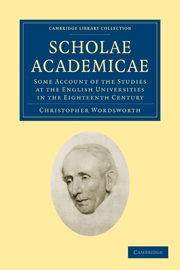 Scholae Academicae
Scholae Academicae Book contents
- Frontmatter
- PREFACE
- Contents
- CHAPTER I GENERAL INTRODUCTION
- CHAPTER II THE TRIPOS, name and thing
- CHAPTER III THE SOPHS' SCHOOLS before 1765
- CHAPTER IV ACTS AND OPPONENCIES after 1772
- CHAPTER V THE SENATE-HOUSE
- CHAPTER VI THE ADMISSION OF QUESTIONISTS. Huddling
- CHAPTER VII THE MATHEMATICKS
- CHAPTER VIII THE TRIVIAL ARTS
- CHAPTER IX HUMANITY
- CHAPTER X MORALS AND CASUISTRY
- CHAPTER XI LAW
- CHAPTER XII MODERN STUDIES
- CHAPTER XIII ORIENTAL STUDIES
- CHAPTER XIV PHYSICK
- CHAPTER XV ANATOMY
- CHAPTER XVI CHEMISTRY
- CHAPTER XVII GEOLOGY AND MINERALOGY
- CHAPTER XVIII BOTANY
- CHAPTER XIX The Degree of M.A.
- CHAPTER XX MUSICK
- CHAPTER XXI ASTRONOMY
- CHAPTER XXII CONCLUSION
- APPENDICES
- INDEX
CHAPTER XII - MODERN STUDIES
Published online by Cambridge University Press: 07 September 2010
- Frontmatter
- PREFACE
- Contents
- CHAPTER I GENERAL INTRODUCTION
- CHAPTER II THE TRIPOS, name and thing
- CHAPTER III THE SOPHS' SCHOOLS before 1765
- CHAPTER IV ACTS AND OPPONENCIES after 1772
- CHAPTER V THE SENATE-HOUSE
- CHAPTER VI THE ADMISSION OF QUESTIONISTS. Huddling
- CHAPTER VII THE MATHEMATICKS
- CHAPTER VIII THE TRIVIAL ARTS
- CHAPTER IX HUMANITY
- CHAPTER X MORALS AND CASUISTRY
- CHAPTER XI LAW
- CHAPTER XII MODERN STUDIES
- CHAPTER XIII ORIENTAL STUDIES
- CHAPTER XIV PHYSICK
- CHAPTER XV ANATOMY
- CHAPTER XVI CHEMISTRY
- CHAPTER XVII GEOLOGY AND MINERALOGY
- CHAPTER XVIII BOTANY
- CHAPTER XIX The Degree of M.A.
- CHAPTER XX MUSICK
- CHAPTER XXI ASTRONOMY
- CHAPTER XXII CONCLUSION
- APPENDICES
- INDEX
Summary
Nerissa. What say you then to Fauconbridge the yong Baron of England?
Portia. You know I say nothing to him, for hee vnderstands not me, nor I him ; he hath neither Latine, French nor Italian, and you will come into the court & sweare that I haue a poore pennie-worth in the English.
The Merchant of Venice, Act i.In very early times universities seem to have taken great interest in such geography and history as was known. As, according to a well known legend, Herodotus read his history at a panathenaic festival when young Thucydides was by, so we read that Giraldus de Barri (Cambrensis) recited his Topographia Hiberniae in the convention of the university of Oxford at the close of the 12th century, and Rolandius his chronicle in the presence of the professors and scholars of Padua.
Before the twelfth century the study of History meant reading the work of Paulus Orosius, a book founded on his master Augustine's De civitate Dei.
In later times a taste sprang up for rhyming chronicles, and mirabilia mundi; then for moral tales and anecdote, flowers of histories, illustrative of the Virtues and Vices, and (with the exception of the interesting and romantic character of their incidents) bearing scarcely higher claims to the title than the History of the Fairchild Family, or the story of Sandford and Merton. Such were the Gesta romanorum and the Speculum historiarum, printed in 1483.
- Type
- Chapter
- Information
- Scholae AcademicaeSome Account of the Studies at the English Universities in the Eighteenth Century, pp. 147 - 161Publisher: Cambridge University PressPrint publication year: 2009First published in: 1877
